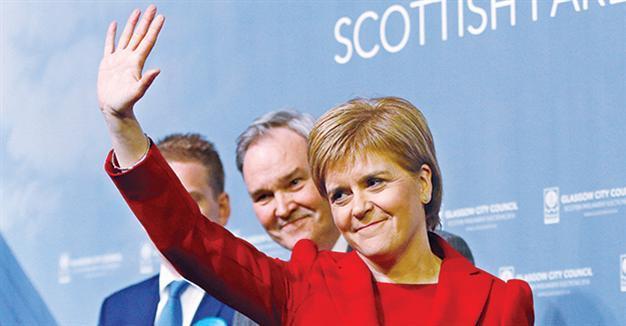Scottish nationalists win but lose ground on UK’s ‘Super Thursday’
LONDON – Agence France-Presse
 Scottish nationalists won a third term in power but lost their outright majority May 6 in one of a series of local and regional elections seen as a key test for Labour leader Jeremy Corbyn.
Scottish nationalists won a third term in power but lost their outright majority May 6 in one of a series of local and regional elections seen as a key test for Labour leader Jeremy Corbyn.The main opposition Labour Party came third in the vote for Scotland’s devolved parliament but its candidate Sadiq Khan is expected to clinch victory in London to become the city’s first Muslim mayor.
Deputy leader Tom Watson told BBC radio the results were a “mixed picture” for Labour, whose socialist leader Corbyn has come under pressure after a scandal over alleged anti-Semitism among some party members.
“We certainly have to make progress in Scotland before the next general election,” Watson said.
Nicola Sturgeon, leader of the pro-independence Scottish National Party (SNP) claimed the result as a major victory as her party seeks a mandate to move towards a second independence referendum.
“What is now beyond doubt is that the SNP has won a third consecutive Scottish Parliament election.” Sturgeon said. “We have tonight made history.”
However, the 63 seats out of 129 won by the SNP fell short of polling ahead of the election which had suggested it would retain its majority.
The party, which previously had 69 seats, will now have to seek the support of a smaller party like the Greens to govern.
The result of London’s mayoral election was expected later May 6, with Khan tipped to secure an easy victory over Conservative Zac Goldsmith.
Early returns put Khan well ahead of Goldsmith in first preference votes.
The often dirty race to replace Conservative Boris Johnson has pitched two very different candidates against each other -- Khan, the Muslim son of a bus driver and a seamstress, against Goldsmith, multimillionaire son of a financier.
In England, Labour suffered losses in local council elections, though they were not as heavy as predicted, damping down talk of a possible leadership challenge to Corbyn.
With results from 80 councils in, Labour had 41, down one, and 780 seats, down 26.
Prime Minister David Cameron’s Conservatives had control of an unchanged 20 councils and 475 seats, up eight.
















